The Biblical Case for Opposing Tyranny, Part 1
It is in the interest of tyrants to reduce the people to ignorance and vice. For they cannot live in any country where virtue and knowledge prevail.
—Samuel Adams—
If Truth is taken away from us, then Right and Wrong are taken from us as well. If we don’t know Right and Wrong, then we can’t, we won’t control ourselves, but will look to someone else to bring order through brute force and raw power. We will be controlled by a tyrant, and we will no longer be free.
—Frank Peretti—
Key point: To effectively resist illegitimate government mandates, we must first become familiar with God’s design for governments and His design for the exercise of governmental authority in its various spheres. We can more effectively resist abuse when we are able to readily recognize it.
On Sunday, September 26, Sam Jones, pastor of Faith Baptist Church in Hudson, Iowa, preached a message titled “The Biblical Case for Religious Exemptions.” In this post and the next, I’d like to recap some of the insights Pastor Sam offered regarding God-ordained governments, abuse of divinely delegated authority, decisions of conscience, and religious exemptions.

Part 1 primarily will focus on the various types of authority God has delegated, and how knowing God’s design for government in its various forms gives us understanding about how to navigate some of the choices that confront us today, in our tyranny-prone world. Sam’s sermon is available on video and in written form at the end of this article. While I have relied on it heavily as I have written this article, I do more here than merely report what Sam said. I share several additional insights that flow from and relate to the points the Iowa preacher made. One might say I build on Sam’s initial, excellent work. While I certainly want people to read what I have written here and what I’ll share in part 2, there’s no substitute for listening to Sam’s sermon directly. I can’t recommend it highly enough.
Four Types of Government
We tend to think of government only in terms of its manifestation in civil society. We call this civil government. But civil government isn’t the only type of government God authorized. God did not ordain just one sphere of government or authority, but four. In Scripture we see
Let’s look at each of these. We’ll have more to say at this point about civil government than the other three forms, but keep in mind the larger picture. This post is not primarily about civil government, but about the different forms or spheres of government God has established and recognizes, and about the specific responsibilities of each. It’s also about how each of the spheres relates to the other three spheres God has ordained.
Civil Government
The Bible’s initial statement regarding the purpose for civil government can be found in Genesis 9:6, with verses 1-17 as its broader context.

Note that in these verses God established a covenant with Noah. God emphasized to Noah and his wife, and to their sons and their wives,
-
- that He was broadening their food supply to include meat from animals,
- that human life is sacred,
- that they should “be fruitful and multiply; spread out over the earth and multiply on it,” and
- that He was placing His bow in the clouds to remind humanity of His covenant, a covenant that includes a promise not to destroy the earth again with a flood.
- Although it wasn’t stated explicitly, the rainbow also would be a reminder of God’s supreme authority over humanity.
Authority Is Given to Civil Government to Protect Human Life by Punishing Murderers

So, Genesis 9:6 represents the establishment of civil government. The building of the Tower of Babel reflects the new reality of civil government and the kind of community it validates. People came together and, through a camaraderie that didn’t exist before, worked together to build the tower. Yet they acted contrary to God’s intention from the start, because they replaced God with government (see Gen. 11:1-9). When the people refused to recognize and honor God, and when they usurped His authority with their own (and used the tower to do it), God intervened and broke broke up those who had united to defy Him. The people
3said to one another, “Come, let us make bricks and bake them thoroughly.” They had brick for stone, and they had asphalt for mortar. 4And they said, “Come, let us build ourselves a city, and a tower whose top is in the heavens; let us make a name for ourselves, lest we be scattered abroad over the face of the whole earth.”
5But the Lord came down to see the city and the tower which the sons of men had built. 6And the Lord said, “Indeed the people are one and they all have one language, and this is what they begin to do; now nothing that they propose to do will be withheld from them. Come, let Us go down and there confuse their language, that they may not understand one another’s speech.” 8So the Lord scattered them abroad from there over the face of all the earth, and they ceased building the city.
While civil government acts for God with the authority God gave it, it must never act as God.
Therefore, even within a very short time after civil government was established, it was abused — and God stepped in and overruled the implementation of the plans that were underway. The authority of civil government, you see, is delegated — not absolute.
The authority of civil government is delegated — not absolute.
While civil government acts for God with the authority God gave it, it must never act as God. In fact, no government ever has the right to act as God. When any governmental entity (whether civil, family, ecclesiastical, or individual) acts as God, it oversteps its delegated authority. God will hold it accountable.
Capital Punishment for Murderers as Prescribed in Genesis 9:6 Is the Foundation of Civil Government

Genesis 9:6, to which we referred earlier, declares,
Whoever sheds man’s blood,
By man his blood shall be shed;
For in the image of God
He made man.
Here we see the foundation of civil government. The principle is this: At its most foundational level, the purpose of government is to punish the wicked and protect the innocent — and in doing so to preserve the image of God in human beings.
At its most foundational level, the purpose of government is to punish the wicked and protect the innocent — and in doing so to preserve the image of God in human beings.
Centuries later, the apostles Paul and Peter would write explicitly and more specifically about this. Romans 13:1-7 and 1 Peter 2:13-17 reveal God’s design for government in the civic arena. Also, in 1 Timothy 2:1-2, Paul would highlight a result of government’s properly fulfilling its delegated responsibilities — societal order.
Let’s summarize: What is government’s job? Civil government’s job is to commend or reward those who do right and to punish those who do wrong. When government acts in this way, it maintains societal order. Without order, no society can function.
Of course, other legitimate tasks exist for government, such as maintaining a military force to defend the country and maintaining monetary and economic systems. These are implicitly affirmed in the Bible, as they are assumed to be legitimate governmental tasks. What Scripture does not authorize government to do is provide for the nation’s people. God gives that job to the people themselves.
What is the task God assigned to civil government? Government’s job is to commend or reward those who do right and to punish those who do wrong. When government acts in this way, it maintains societal order.
People Who Police Themselves Need Fewer Police in the Community
In a few moments, we will briefly discuss self-government and the biblical basis for recognizing it. Self-government is needed in every society to maintain order and freedom. If and when people voluntarily obey God’s laws, they can exercise a great measure of freedom, including freedom to create, produce, interact with others, buy, sell, trade, prosper, worship as they choose, pursue happiness, and enjoy life. Note that
-
- freedom or personal liberty
goes hand-in-hand with
-
- fulfilling one’s duty and responsibilities to God and
- respecting the rights of others as expressed in the Ten Commandments.
Please pay close attention to this section. It is vitally important that Christians, and all freedom-loving people, understand what we’re saying here. It is this kind of freedom (freedom regulated by widespread respect for God’s laws) that makes it possible for a society to affirm personal liberty while, at the same time, maintaining order. As Founding Father John Adams observed, “Our constitution was made only for a moral and religious people. It is wholly inadequate to the government of any other.”
The more people respect and align their behavior with God’s expressed will, the less the civil government needs to act. Further, the less respect society has for divine laws, the more government must work to maintain justice and promote order. It easily can snowball from there. The more government must act, the less freedom the people have, and the more opportunity tyrants have to rule with an iron fist.
Civil Authority, Like the Authority in Each of the Four Spheres of Government, Is Delegated
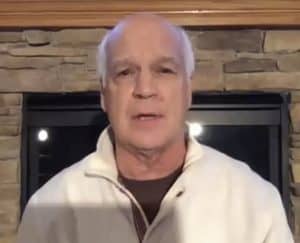
No government, and no form of government, has unlimited authority. All governmental authority (including civil, ecclesiastical, family, and self) is divinely delegated.
Paul’s and Peter’s statements about civil government in Romans 13:1-7 and 1 Peter 2:13-17 should be viewed as prescriptive, not descriptive. When Paul wrote his letter to the Roman Christians, Nero was emperor; and Nero certainly wasn’t acting to fulfill God’s design for government. He was abusing his God-given authority. As Del Tackett indicates in The Truth Project, these passages reveal God’s design for government; they are filled with “design language.” Therefore, Scripture does not command submission to government in absolutely everything it — government — might direct. Let’s make it personal. When government tells you you must not do something God commands, or when it requires you to do something God forbids, it is acting illegitimately, and it is your duty to disobey the government and obey God.
Paul’s and Peter’s statements about civil government in Romans 13:1-7 and 1 Peter 2:13-17 should be viewed as prescriptive, not descriptive.
What Responsible Stewardship of Civil Authority Looks Like
The Founders of the United States of America got it right when, in the Declaration of Independence, they said,
We hold these truths to be self-evident, that all men are created equal, that they are endowed by their Creator with certain unalienable Rights, that among these are Life, Liberty and the pursuit of Happiness. — That to secure these rights, Governments are instituted among Men, deriving their just powers from the consent of the governed,
-
-
- Note that when government does what Romans 13:1-7 and 1 Peter 2:13-17 say God has authorized it to do — commend those who do right and punish those who do wrong — people’s unalienable, God-given rights are protected.
- Note also that it is not the purpose of government to create rights, but to protect natural rights, rights that already exist. Same-sex “marriage” is a great example of a “right” that never would exist without the government’s creating it, because it does not exist naturally.
- Therefore, with the creation of this artificial right (same-sex “marriage”), the natural rights of others have been infringed upon. See Principle 8 in this article, and ask Barronelle Stutzman and Jack Phillips if their rights haven’t been affected.
- Note further: As we said earlier, it is not government’s responsibility to meet the people’s needs. That job belongs to the people themselves.
-
Let’s continue by looking briefly at Scriptural support for the three other forms of government Pastor Sam affirmed.
Ecclesiastical or Church Government
 We read about ecclesiastical or church government in Hebrews 13:7,17 and 1 Peter 5:2-4. While these passages do not mention any exceptions to the command to obey pastors, it remains true that a pastors’ and other spiritual leaders’ authority is delegated and not absolute. No one ever is to submit to them if they advise doing anything contrary to God’s revealed will. Further, we should recognize that ecclesiastical authority is distinct from the authority of the civil government. Neither entity is to try to exercise authority in the other’s sphere. These are separate jurisdictions.
We read about ecclesiastical or church government in Hebrews 13:7,17 and 1 Peter 5:2-4. While these passages do not mention any exceptions to the command to obey pastors, it remains true that a pastors’ and other spiritual leaders’ authority is delegated and not absolute. No one ever is to submit to them if they advise doing anything contrary to God’s revealed will. Further, we should recognize that ecclesiastical authority is distinct from the authority of the civil government. Neither entity is to try to exercise authority in the other’s sphere. These are separate jurisdictions.
Family Government

Family government is yet another sphere of authority that is separate and distinct. We read about family government in Scripture in Colossians 3:20, Ephesians 5:22-25, and Ephesians 6:1-4. This is not an exhaustive list of passages about family government, but it is representative. Note carefully that children are the responsibility of their parents, not the state. When the state acts as if children belong to it rather than parents, it is overstepping its authority and acting illegitimately.
Parents are responsible for raising, training, and educating their children. The state is not.
Self-Government
Self-government is highlighted in Scripture in numerous places, but Proverbs 25:28 and Titus 2:6 (context vv. 6-8) are two key passages emphasizing it. Also, Scripture commends discipline and hard work, as well. Hear Pastor Sam briefly describe self-government.
Principles to Remember
One: The relationships between these four types of governments are not best represented by a chain, but by different lanes of traffic.

In other words, each sphere of authority has its own job and its own set of responsibilities, and the individual or individuals charged with fulfilling those specific responsibilities are not to wield their authority in the other spheres. When they do, their actions are illegitimate. Yes, at times there will be overlap between spheres, or tasks that are similar. Nevertheless, each person or persons with authority must act in the sphere in which he/she/they are given authority, and not in another or in others.
Two: Many who have read these passages of Scripture (civil government: Rom. 13:1-7; 1 Pet. 2:13-17; 1 Tim. 2:1-2 • ecclesiastical or church government: Heb. 13:7,17; 1 Pet 5:2-4 • family government: Col. 3:20; Eph. 5:22-25; Eph. 6:1-4 • self-government: Prov. 25:28; Titus 2:6, 6-8) have noted that obedience to authorities is commanded without any exceptions being given. This does not mean we should obey in every possible scenario. We alluded to this earlier when we talked about ecclesiastical authority. When any authority orders actions prohibited by God or forbids actions commanded by God, people — and especially God’s people — have a responsibility “to obey God rather than men” (Acts 5:29). Thus, while exceptions to obeying aren’t mentioned in these specific texts, they are affirmed in other places in Scripture. Scripture’s assumption in the texts is that those in authority are acting responsibly.
When any authority orders actions prohibited by God or forbids actions commanded by God, people — and especially God’s people — have a responsibility “to obey God rather than men” (Acts 5:29).
Three: God’s having delegated His authority in each of these four spheres does not mean God is separate from each sphere, as pictured in Item 1 below, but that God is, and is to be, over all the spheres of government, as illustrated in Item 2. Item 2 not only indicates that God has delegated authority within each sphere, but also that He will hold those responsible in each sphere for how well he, she, or they stewarded the delegated responsibility.
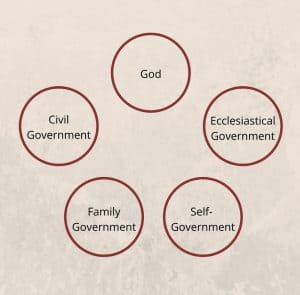
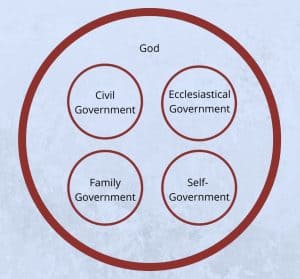
Four: Civil government, or the state, is very powerful, for God has been given it “the sword” to punish evildoers. When those in authority in civil government begin to abuse their power and wield the sword to nefarious ends, tyranny results. The state effectively kicks God out and seeks to exercise authority in all the other spheres, even though God did not give the state (or civil government) jurisdiction in these areas (see Item 3).
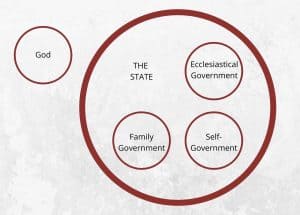
In lesson 9 of the biblical worldview video series titled The Truth Project, instructor Del Tackett describes the ugly nature of this scenario. Dr. Tackett has named more spheres of authority than Pastor Sam has, but the principles, and the terrible scenario that unfolds, remain the same.
This is happening in America today. For example, despite the fact that God designed that parents would have primary responsibility for the upbringing and training of their children, the state is taking strong steps to act in the parental role.
On Tuesday evening, September 28, Virginians watched a debate between their two gubernatorial candidates — Democrat Terry McAuliffe and Republican Glenn Youngkin. Writing for the Home School Legal Defense Association Action, Joel Grewe reported,
As someone who has worked in the education arena of politics for thirteen years, I’ve never heard a clearer statement from a politician about what state-run education means.

Former governor and current gubernatorial candidate Terry McAuliffe was asked why he vetoed a bill that would have given parents input into the resources available to their children in school libraries. This is how he responded:
“I’m not gonna let parents come into schools and actually take books out and make their own decisions… I don’t think parents should be telling schools what they should teach.”
Watch and hear it here.
I don’t think parents should be telling schools what they should teach.
—Virginia gubernatorial candidate Terry McAuliffe—
Could a clearer instance of abuse of divinely delegated authority be cited? Yet this isn’t the only crystal clear example.
-
- An article in the online news service Citizen Free Press declares, “Protesting your school board is now Domestic Terrorism.”
- Not to be outdone, California Governor Gavin Newsom has issued vaccine mandates for all of California’s school children, even those attending private schools.
- Dr. Anthony Fauci says he “would support” vaccine mandates for airline travel and schools. Despite indications that natural immunity provides greater protection from Covid than a vaccine alone, Dr. Fauci seems to have difficulty addressing this matter. As one article affirms, natural immunity “Is a Political Problem for the Regime.” Also, even though he admits children are extremely unlikely to die from Covid, Fauci still supports a vaccine mandate for children. Finally (even though what we’re citing represents only “the tip of the iceberg” with regard to Fauci), take a look at this article from The Daily Wire: “Fauci Slammed After Declaring It’s ‘Just Too Soon To Tell’ If People Can Gather For Christmas.” Listen:
Make no mistake; all of this is tyranny. It is government acting as God. But wait! There’s more!
Five: Your health is not the state’s responsibility. It’s your responsibility. Moreover, your health is outside of the state’s jurisdiction.

One mother in the Northwest lost her life as a result of being forced to take the Covid-19 vaccine against her will. Desperately wanting to participate in her daughters’ school activities on site, she felt she was left with no other choice.
In New York, “Governor Kathy Hochul signed an executive order last night [on Sept. 28] declaring a statewide disaster emergency which allows unlicensed health care workers from other states and countries ‘to practice in New York State without civil or criminal penalty related to lack of licensure.'” She’s trying to compensate for her state’s shortage of health care workers, a shortage caused when unvaccinated medical professionals were fired for refusing the shot.
Six: Your right to worship is not the state’s to revoke or manipulate. It is outside of the state’s jurisdiction, except for its responsibility to protect it. Nevertheless, a good many state authorities do not realize this or do not care. Authorities have had to be reined in on this issue (also go here); but they still need reminders, not just from lawyers and courts, but especially from pastors and parishioners who refuse to be told they cannot hold or attend public worship. Pastor Sam cites the biblical precedent for the principle that the state has no authority to regulate worship.
In the end, Daniel was vindicated. He survived a full night in the lion’s den. As Daniel declared to the king, “God sent His angel and shut the lions’ mouths, so that they have not hurt me, because I was found innocent before Him; and also, O king, I have done no wrong before you” (Dan. 6:22).

The Bottom Line
As you can see, Pastor Sam presents some very strong points as he builds the biblical case for religious exemptions. Next time we will consider more of them, but for now, please note that all the items we have discussed thus far already constitute strong case for resisting illegitimate mandates — directives issued beyond God-given authority and outside the appropriate sphere or jurisdiction.
While we Christians must respect and obey all lawful and legitimate authority, we also must push back against illegitimate authority. We must insist that leaders lead within the spheres designated or assigned to them.
More to come! Stay tuned!
Part 2 is available here.
A page summarizing both parts in this series is available here.
Sermon by Pastor Sam Jones — audio in four parts:
Part 1
Part 2
Part 3
Part 4
Sam presented the content of his sermon in an article published in the Iowa Standard here.
Copyright © 2021 by B. Nathaniel Sullivan. All rights reserved.
top image credit: Lightstock
image credit: Kathy Hochul
Unless otherwise indicated, Scripture has been taken from the New King James Version®. Copyright © 1982 by Thomas Nelson, Inc. Used by permission. All rights reserved.

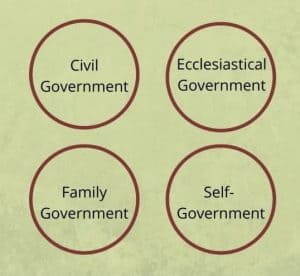
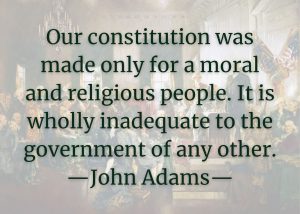

Be First to Comment